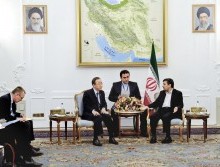
After months of refusing to resume negotiations on their nuclear program, Iran on Wednesday announced that they and the European Union had agreed to resume talks in November. Following a meeting with EU foreign affairs Deputy Secretary General for Political Affairs Enrique Mora, Iranian Deputy Foreign Minister for Political Affairs Ali Baqeri Kani posted to Twitter that he “had a very serious & constructive dialogue with @enriquemora_ on the essential elements for successful negotiations. We agree to start negotiations before the end of November. Exact date would be announced in the course of the next week.”
The tweet follows six rounds of ultimately unfruitful talks to reset the nuclear deal between Iran and the world powers, known as the Joint Comprehensive Plan of Action (JCPOA), which exchanged sanctions relief to Iran for concessions and restrictions on Tehran’s nuclear program. The US, under former President Donald Trump, withdrew from the JCPOA back in 2018 due to serious flaws in the accord and resumed crippling sanctions on Iran. In response to the US withdrawal, Iran withdrew from some of their commitments under the JCPOA and more recently have been making troubling progress towards weapons-grade nuclear fuel.
In that context, Wednesday’s Iranian tweet also comes just one day after the United States reiterated their warning that the “window is closing” on resuming talks. “We continue to believe the window for diplomacy remains open,” spokesperson Ned Price told reporters on Tuesday in comments published by the US State Department. “But that is not a window that will be open indefinitely, and it cannot be open indefinitely because as Iran continues to advance its nuclear program, as it has distanced itself from the commitments it made in the JCPOA context, eventually the advantages that the JCPOA
[provided]
…will be negated by the advances that Iran will have made in its nuclear program.”
While Iran is all set to resume talks with the EU and by extension several other parties to the JCPOA—China, Russia, the UK and Germany, or so-called G4+1—the Iranian Fars News Agency summarized on Wednesday comments from Iranian diplomat Kani as saying work is not yet complete for a return to talks with the Americans. Furthermore, Kani was effectively dismissive of claims the negotiations need to happen with the US—currently the main force behind economic sanctions on Iran.
The Fars article quoted Kani as saying, “We had such talks in previous periods [with EU], and now in the continuation of the same talks, he [Enrique Mora] plays the role of coordinator of the G4+1 and Iran, and these talks have been formed on that basis.”
Despite the apparent absence of the US in the resumed talks, Kani claimed the focus would be on lifting sanctions, seemingly expecting progress to be made on lifting US sanctions without the US being directly involved.
Intriguingly, the EU may not be as excited as Iran about these talks resuming. While Kani was quick to promote the resumption on Twitter, Mora’s Twitter feed notably did not include any comments about the meeting with Kani. Instead, Mora posted the next day on his feed about a meeting with the International Atomic Energy Agency (IAEA), the nuclear watchdog that is charged with overseeing Iran’s compliance with nuclear agreements, tweeting “the IAEA is the cornerstone of the non proliferation architecture.”
And while the EU and Iran tentatively set up renewed nuclear talks, the US isn’t the only nation concerned about Iran’s nuclear progress. Israeli Prime Minister Naftali Bennett, while meeting on Thursday with Swiss President Guy Parmelin, “presented the Israeli view on the Iranian threat,” according to a press statement from Bennett’s office, and asked that Switzerland, as an IAEA Board of Governors member, “press for decisive steps against Iranian progress in their nuclear project.”
Israeli President Isaac Herzog also brought that message on Tuesday—to an international group of air force commanders meeting for the Blue Flag aerial exercises in Israel.
In comments published by Israel, Herzog told the military leaders, “What you are doing here is anchoring stability in a tumultuous region faced by terrorists and Iran. We are confronting one coalition, a coalition of hatred, terror, and radicalization, led by Iran. We are here to make sure that peace prevails.”
The press release said Herzog also added he hoped to continue to meet with the commanders, but “only in times of peace.”
Israeli Air Force Commander Maj. Gen. Amikam Norkin was even more explicit on the air force role vis-à-vis Iran. He was quoted in the Israeli press release as saying, “We must adopt new strategies to confront the present threats in this period. The Israeli Air Force must prepare and grapple with a range of threats, confronting on the one hand the Iranian nuclear project and on the other terror organizations.
“First and foremost, we must defend ourselves.”
(By Joshua Spurlock, www.themideastupdate.com, October 28, 2021)
